September 9, 2019—The American Literary Translators Association (ALTA) is delighted to announce the shortlist for the 2019 Italian Prose in Translation Award. Starting in 2015, the Italian Prose in Translation Award (IPTA) recognizes the importance of contemporary Italian prose (fiction and literary non-fiction) and promotes the translation of Italian works into English. This prize is awarded annually to a translator of a recent work of Italian prose (fiction or literary non-fiction). This year’s judges are Allison Grimaldi-Donahue, Alta L. Price, and Zakiya Hanafi.
The award-winning book and translator for 2019 will receive a $5,000 cash prize, and the award will be announced during ALTA’s annual conference, ALTA42: Sight and Sound, being held this year from November 7-10 in Rochester, NY. If you can’t join us in person, follow our Twitter, Facebook, and Instagram (@littranslate) for the announcement of the winners!
The 2019 Italian Prose in Translation Award Shortlist (in alphabetical order by title):
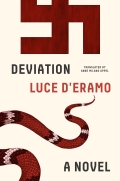 Deviation
Deviation
By Luce D’Eramo
Translated from the Italian by Anne Milano Appel
(Farrar, Straus and Giroux)
This is an astonishing book by any measure: it systematically trespasses on all boundaries and expectations—of genre, narrative conventions, human limits and morality itself. Billed as “A Novel,” it actually recounts the author’s harrowing experiences of life in the Nazi concentration camps, through an autobiographical lens we’ve not yet been privy to: that of an 18-year-old Italian girl from a well-to-do Fascist family who runs away from home to volunteer in a German labor camp—with pictures of her idols Hitler and Mussolini in her backpack—in order to disprove the “lies” that were circulating about them. The subsequent events read like a picaresque saga, a Dantesque voyage through hell, and yet they are real . . . or are they? As translator Anne Milano Appel points out in her introduction, this book is as much about the shifting sands of memory, its willful omissions, repressions and inventions that make us unrecognizable to ourselves, as it is about the phenomenal courage of an exceptional human being whose brutal honesty alone has a transformational effect on readers. This is a vitally important book, written in spurts over three decades, published for the first time in Italian in 1979, that is a privilege to read now in such a lucid, unflinching English translation.
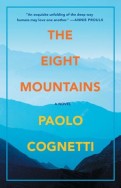 The Eight Mountains
The Eight Mountains
By Paolo Cognetti
Translated from the Italian by Simon Carnell and Erica Segre
(Atria Books & Harvill Secker)
Short-story writer Paolo Cognetti’s first novel—a meditation on the deeper meanings of friendship and family—has become an instant international classic in 38 languages, and for good reason. Probing the themes of male friendship and father-son relations, it casts the mountains in the role of a teacher whose lessons are taught through the challenging, exhilarating and often devastating ascents and descents of life. The characters, so tied to the Italian alps in which they live, are brought to life through gentle description and precise dialogue. Cognetti has described his creative process as “writing from truth,” “like a painter with a palette” as he walks the alpine landscapes, kneading his experience of the land and its natural seasons into words. To do this, he has had to learn a whole new vocabulary from his mountain friends that “the Italian of the plains” does not possess—words in dialect injected into the narrative that create a sort of otherworldliness, “as if it were a foreign language.” Poet Simon Carnell and writer Erica Segre capture this foreignness with serenity in their translation, soothingly transforming his lyrical descriptions into a lilting, cascading English. Like the author himself, we come to understand the title’s meaning only as the story unfolds and the horizon opens up onto the next peak, folding the past back onto itself and revealing the aching rewards of nostalgia. This novel asks questions of class, education, generational differences, and the ways in which friendships can move with time, portraying the varied kinds of love the human condition allows us to experience.
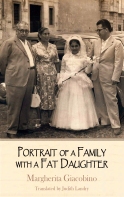 Portrait of a Family with a Fat Daughter
Portrait of a Family with a Fat Daughter
By Margherita Giacobino
Translated from the Italian by Judith Landry
(Dedalus)
This engaging novel follows four generations of a family living in the Alpine foothills outside Turin, spanning the late nineteenth century to the “economic miracle” of the 1950s and 60s, as they climb out of poverty into a new world of TV dinners and other novelties. It’s Margherita Giacobino’s first appearance in English, and her prior accomplishments as writer and translator shine through in this finely crafted saga. Combining fact and fiction, the narrator’s grandmother emigrates to California and returns to Italy partially paralyzed after complications during childbirth. In the next generation, the narrator’s eight-year-old mother returns to Italy upon her father’s death, to be raised by distant relatives, become Italian (again), and wed an alluring “man-boy” whose character and time in a German prison camp in World War II are evocatively described. Her small shop gradually expands and lifts the family out of the working class; her studious daughter Margherita grows up amid an extended matriarchal family to become the writer of this book. It has been compared to “a rural version of Elena Ferrante’s Neapolitan saga,” but remains staunchly unique in its powerful, atmospheric portrayal of largely unexplored terrain. A winner of the English PEN Award, this sweeping narrative explores what it means to be Italian across oceans and historical epochs. Its vivid descriptions and deep cultural understanding leave a lasting mark.
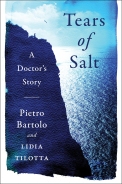 Tears of Salt: A Doctor’s Story
Tears of Salt: A Doctor’s Story
By Pietro Bartolo and Lidia Tilotta
Translated from the Italian by Chenxin Jiang
(W.W. Norton & Company)
A physician’s stirring account of his experiences with refugees, this relevant, timely book combines personal memoir and public indictment; Chenxin Jiang’s translation is pitch perfect. The narrative jumps around in time, weaving a collection of memories into a hopeful call to action. Director of the sole medical clinic on Lampedusa, Bartolo expresses compassion, confusion, disbelief and outrage. He reflects on his life’s parallels and differences with those of the men, women and children arriving in his homeland by boat. Reading the tales of his patients—often victims of racism, human trafficking, rape, sexual mutilation and organ theft—we’re also reading the stories of strong survivors bearing witness for those who didn’t make it: “You can wear all the protective gear you like, but you cannot protect your soul. This is war.” Readers who saw the award-winning documentary Fire at Sea will recognize Bartolo and gain greater insight as he connects what he’s witnessed to the Holocaust, condemning mass indifference to supposedly faraway tragedies. This slim volume eloquently exhorts readers to honor the individual stories behind the headlines—many of which never even appear in the North American press. This poignant chronicle by a doctor and journalist tending to the refugees crossing the Mediterranean to arrive on the shores of a new life is a welcome addition to the international literature of migration.
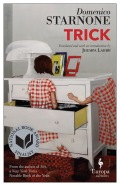 Trick
Trick
By Domenico Starnone
Translated from the Italian by Jhumpa Lahiri
(Europa Editions)
Daniele, the aging illustrator who is the narrator of Trick, comes back to stay at his daughter’s apartment, once his childhood home in Naples, to babysit his four-year-old grandson. Little by little the boy’s playful antics take on the traits of a malefic force, ultimately compelling his grandfather to confront his personal demons: a retrospective questioning of his artistic vocation, and a waning self-confidence that accompanies his physical decline. Interwoven into this acute, anguished game between child and old man––a sort of surreal “trick or treat”––is the intertextual play with Henry James’ ghost story “The Jolly Corner,” a work that the narrator is in the process of illustrating. Translator Jumpha Lahiri’s introduction explores this aspect of the text especially, which she describes elsewhere as “ingenious, artful, profound,” and the linguistic challenges of Starnone’s language, which, like Naples itself, embodies an exasperated contradiction between “incredible refinement and violence.” Her translation, a finalist for the National Book Award and New York Times Notable Book of the Year, captures these difficult, complex characters in sharp dialogue and lyrically interprets these heartbreaking lives and their personal struggles with ambition and attachment.
